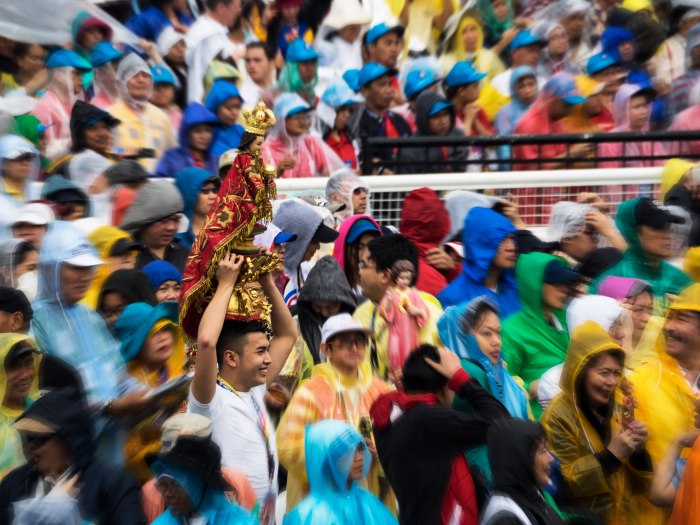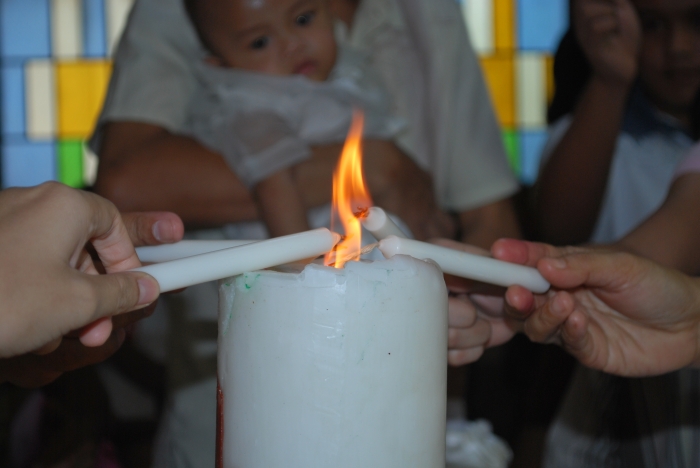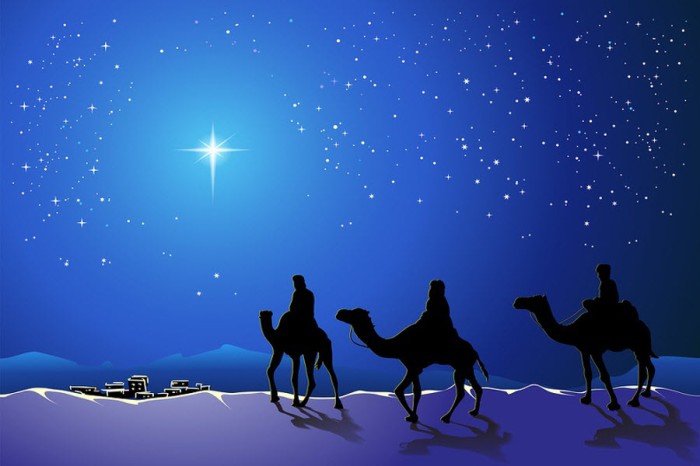
While the rest of the Catholic world celebrates the 2nd Sunday in ordinary time, the Philippines Catholic Church celebrates the feast of Santo Niño (Holy Child Jesus). Vatican granted the Philippines Church a special permission to celebrate the Feast of the Santo Niño every third Sunday of January because of the Filipinos’ exuberant devotion to Santo Niño.
The celebration of the feast of Santo Niño is a beautiful expression of the wedding between the Christian faith and the Filipino culture. Santo Niño symbolizes, on the one hand, the introduction of the Christian faith to the Filipino people. On the other hand, Santo Niño symbolizes the celebration of the Filipino culture. The relic of Santo Niño is the first Christian image that set foot on Philippine soil, originally as a gift from explorer Ferdinand Magellan to Rajah Humabon and his chief consort on account of their baptism in 1521.
The native Filipinos welcome the relic of Santo Niño and the whole Christian faith, however, according to their cultural sensibilities. The cultural appropriation of Santo Niño is beautifully expressed in the dance called Sinulog. Before the Spanish conquistadores came, Sinulog was already danced by the natives in honor of their wooden idols and Anitos. The natives then adapted the Sinulog as a dance ritual in honor of the miraculous image of the Santo Niño. Thus, Sinulog became the link between the country’s indigenous past and its Christian present.
While devotees dance the sinulog, they chant “Pit Señor.” “Pit Señor” is the short form of “Sangpit sa Señor,” a phrase in Cebuano that means, “to call, ask, and plead to the king.” Indeed, the image of Sto. Niño depicts an innocent boy Jesus with a smiling face yet dressed as a king. Dressed in the robes of a king, crowned and holding the sceptre, the globe and the cross, Sto. Niño reminds us of the link between God’s Kingdom and the mystery of spiritual childhood. These enigmatic contrasting elements provide us with one of the profound reasons to believe that Sto. Niño is our protector and has the power to grant and answer our prayers as many miracles have attested.
The readings of today’s feast invites us not just to venerate the relic of Santo Niño but more importantly to imitate the ways and values of Santo Niño.
In the first reading, Isaiah prophesied that “the people who walked in darkness have seen a great light.” This light will be a child who will be born among them, “upon his shoulder dominion rests.” The description of the child sends a strong message to the oppressors of Israel. The child is not someone to be babied, not a weakling, but a strong leader. The child will defeat machineries of oppression and rule over Israel with wisdom, peace, justice and good judgment.
In the gospel today, Jesus called a child and put the child among his disciples :
“Amen, I say to you, unless you turn and become like children, you will not enter the kingdom of heaven. Whoever humbles himself like this child is the greatest in the kingdom of heaven.”
When Jesus used the symbol of the child it has nothing to do with romanticizing the child. Jesus brought out the symbol of the child in the context of the Kingdom of God when he asked:
“Who is the greatest in the kingdom of heaven?”
Who is the child in Jesus’ society during his time whom he considered as the greatest in God’s kingdom? Who are the children that Jesus referred to? The image of child or children represents the poor, the anawim, the insignificant, powerless, the “little ones” in Jesus and the Biblical times. They have no status and position in society. Who are the children in God’s eyes today? They are the poor who continue to be poor despite the massive display of wealth by the few, they are the victims of calamities–natural and human made, they are the victims of violence and extra-judicial killings, they are the powerless who are manipulated by powerful politicians and misled by fake news and misinformation, they are the sick and the dying who have no one to care for them, they are amongst us who are desperate and have no one to turn to but fellow poor and God.
When Jesus said to turn and become like children does not mean to become a child but to become anawim, poor, to become like one who depend on no one else but God. They are the least, the humble, the hungry, the thirsty, the prisoners, and the sick. They are people who need other people, and they are people who need God’s protection. They long for God to reign in their lives.

In other words, to become like little children is to become poor. We can only enter the kingdom of God if we become poor. No one can enter the Kingdom of God without being truly poor. The self-sufficient, the proud, those who, because they have everything, look down on others, those who have no need even of God—they cannot enter the Kingdom of God. Only the poor, the hungry, those who need someone to come on their behalf, are the greatest in the Kingdom of God.
The second point that Jesus wishes to impart to us in the gospel today is that by becoming children or poor we can take the side and advance the plight of our fellow poor people. Jesus said,
“Whoever receives one child such as this in my name receives me … Let no one despise these little ones, these children… Whoever despises one of these little ones who depend on God. … Beware! Their angels, their guardians, will see what you have done to them and will surely protect them. After all, they depend on God’s protection.”
He reminded his disciples that whatsoever they do to the poor, they did it to him. This is reiterated by Jesus at the end of time when he will return in glory to judge the world,
“Just as you did it to one of the least of these who are members of my family, you did it to me.”
How do we become a child of the Kingdom of God today? We become a child of the Kingdom of God today, by upholding the aspirations of the poor, powerless, marginalized, victims of injustice, intolerance and inhumanity in our own communities, parishes and the wider society. In the midst of all the calamities and miseries we experience today, the image of Santo Niño is a powerful symbol of protest against the values and conditions that contradict the Kingdom of God—power, domination, wealth, violence, pride, injustice, exploitation, inequality and poverty.
The feast of Santo Niño is a beautiful festivity overflowing with profound spiritual meaning. It is nice to dance the Sinulog but let us make our celebration of the Santo Niño go beyond mere pageantry. May it truly transform us into children of the Kingdom of God. To become children of God is not to become childish in our faith. To become children of God goes beyond having a zealous devotion to Santo Niño. To become children of God is to become poor and to cast our lot and struggle together with the poor, the least, the lowly and the most abandoned in our society today.
By doing so, we become the greatest in the Kingdom of God!




